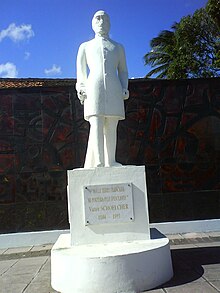Victor Schœlcher
Victor Schœlcher (born July 22, 1804 in Paris , † December 25, 1893 in Houilles near Paris) was a French politician and opponent of slavery in the French colonies .
Life
Victor Schœlcher's parents came from Fessenheim in Alsace , and he grew up in Paris. After his training at the Lycée Condorcet , he also frequented the artistic circles of Paris and got to know George Sand , Hector Berlioz and Franz Liszt .
He inherited the parental china factory. During a business trip to Mexico , Cuba and the American southern states from 1829–31 he got to know the slavery that still prevailed there at the time.
After his return to Paris, he sold the factory and began to be politically and journalistically committed to the abolition of slavery.
As a member of the National Assembly for Martinique in 1848 he was the initiator of the décret d'abolition de l'esclavage du 27 avril 1848 (decree on the abolition of slavery of April 27, 1848), proclaimed on May 22, 1848, which proclaimed the total abolition of slavery in France and its colonies. In 1849 and 1850 he represented Guadeloupe in the National Assembly. After the coup of Napoléon III. In 1851 he went into exile to Belgium and later to London, from where he did not live until 1870 after the reign of Napoléon III. returned to Paris and again represented Martinique in the National Assembly from 1871 to 1875. In 1875 he was appointed senator for life.
Victor Schœlcher died in 1893 at the age of 89 in his house (24 rue d'Argenteuil, now Avenue Schoelcher) in Houilles. He was buried next to his father in the Père Lachaise cemetery.
Honors

By resolution of the National Assembly of the Fourth Republic , the remains of Victor Schœlcher and his father were transferred to the Panthéon on May 20, 1949 at the same time as those of the colonial politician of African origin Félix Éboué and buried in an honorary grave.
During his lifetime, in 1888, the third largest community in Martinique, then called Case-Navire , took on the name Schœlcher . Also named after him is the Bibliothèque Schœlcher in Fort-de-France , which he initiated and opened in the year of his death , to which he donated his important book collection.
In 1952 a 5,000 franc note with his portrait was put into circulation. Since 1982 the house of his ancestors in Fessenheim has housed a museum dedicated to him. Several schools and streets bear his name.
On the day of his inauguration as French President in 1981, François Mitterrand laid a rose on Schœlcher's grave of honor.
Fonts
- Histoire des crimes du 2nd decembre , Chapman, London 1852.
- Victor Schœlcher: Esclavage et Colonization , Avant-propos de Charles-Andre Julien, Introduction d'Aimé Césaire. Texts annotés by Èmile Tersen. Presses Universitaires de France, Paris 1948.
- New edition under the title Victor Schœlcher et l'abolition de l'esclavage . Editions Le Capucin, Lectoure 2004.
literature
- François Blancpain: Les abolitions de l'esclavage dans les colonies françaises (1793–1794 et 1848) . In: Léon-François Hoffmann, Frauke Gewecke, Ulrich Fleischmann (eds.): Haïti 2004 - Lumières et ténèbres. Vervuert, Frankfurt am Main 2008. ISBN 978-84-8489-371-4 . Pp. 63-83.
-
Aimé Césaire : Commémoration du centenaire de l'abolition de l'esclavage . In: Collection du centenaire de la Revolution de 1848 . Presses universitaires de France, Paris 1948
- with considerable changes as a foreword in: Guy Fau: L'Abolition de l'esclavage . Le Burin et Martinsart, Saint-Cloud 1972. pp. 20-33.
- Jean Jolly (ed.): Dictionnaire des Parlamentaires Français, Notices Biographiques sur les Ministres, Sénateurs et Députés Français de 1889 à 1940 . Paris 1960.
- Daniel Maximin: L'isolé soleil . Seuil, Paris 1981; German: Sun Black , translated, with notes and an afterword by Klaus Laabs. Rotpunkt, Zurich 2004.
- Nelly Schmidt: Victor Schœlcher et l'abolition de l'esclavage . Fayard, Paris 1999.
Web links
- The transfer of Schœlcher's remains to the Pantheon in 1948 (video, 1:57, French)
- Information on the website of the municipality of Fessenheim about Maison Schoelcher (French)
Individual evidence
- ↑ Victor Schœlcher on the UNESCO website , accessed on September 6, 2011.
- ^ Ernst Weisenfeld: History of France since 1945 , 3rd revised edition, Beck, Munich 1997, ISBN 3-406-42007-9 , p. 266.
| personal data | |
|---|---|
| SURNAME | Schœlcher, Victor |
| ALTERNATIVE NAMES | Schölcher, Victor |
| BRIEF DESCRIPTION | French politician and freedom fighter |
| DATE OF BIRTH | July 22, 1804 |
| PLACE OF BIRTH | Paris |
| DATE OF DEATH | December 25, 1893 |
| Place of death | Houilles |
